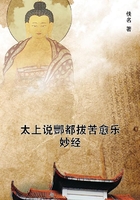The truth is, the world was to Shakespear a great "stage of fools" on which he was utterly bewildered. He could see no sort of sense in living at all; and Dickens saved himself from the despair of the dream in The Chimes by taking the world for granted and busying himself with its details. Neither of them could do anything with a serious positive character: they could place a human figure before you with perfect verisimilitude; but when the moment came for making it live and move, they found, unless it made them laugh, that they had a puppet on their hands, and had to invent some artificial external stimulus to make it work. This is what is the matter with Hamlet all through: he has no will except in his bursts of temper. Foolish Bardolaters make a virtue of this after their fashion: they declare that the play is the tragedy of irresolution; but all Shakespear's projections of the deepest humanity he knew have the same defect: their characters and manners are lifelike; but their actions are forced on them from without, and the external force is grotesquely inappropriate except when it is quite conventional, as in the case of Henry V. Falstaff is more vivid than any of these serious reflective characters, because he is self-acting: his motives are his own appetites and instincts and humors. Richard III, too, is delightful as the whimsical comedian who stops a funeral to make love to the corpse's widow; but when, in the next act, he is replaced by a stage villain who smothers babies and offs with people's heads, we are revolted at the imposture and repudiate the changeling. Faulconbridge, Coriolanus, Leontes are admirable descriptions of instinctive temperaments: indeed the play of Coriolanus is the greatest of Shakespear's comedies; but description is not philosophy; and comedy neither compromises the author nor reveals him. He must be judged by those characters into which he puts what he knows of himself, his Hamlets and Macbeths and Lears and Prosperos. If these characters are agonizing in a void about factitious melodramatic murders and revenges and the like, whilst the comic characters walk with their feet on solid ground, vivid and amusing, you know that the author has much to show and nothing to teach. The comparison between Falstaff and Prospero is like the comparison between Micawber and David Copperfield. At the end of the book you know Micawber, whereas you only know what has happened to David, and are not interested enough in him to wonder what his politics or religion might be if anything so stupendous as a religious or political idea, or a general idea of any sort, were to occur to him. He is tolerable as a child; but he never becomes a man, and might be left out of his own biography altogether but for his usefulness as a stage confidant, a Horatio or "Charles his friend" what they call on the stage a feeder.
Now you cannot say this of the works of the artist-philosophers.
You cannot say it, for instance, of The Pilgrim's Progress. Put your Shakespearian hero and coward, Henry V and Pistol or Parolles, beside Mr Valiant and Mr Fearing, and you have a sudden revelation of the abyss that lies between the fashionable author who could see nothing in the world but personal aims and the tragedy of their disappointment or the comedy of their incongruity, and the field preacher who achieved virtue and courage by identifying himself with the purpose of the world as he understood it. The contrast is enormous: Bunyan's coward stirs your blood more than Shakespear's hero, who actually leaves you cold and secretly hostile. You suddenly see that Shakespear, with all his flashes and divinations, never understood virtue and courage, never conceived how any man who was not a fool could, like Bunyan's hero, look back from the brink of the river of death over the strife and labor of his pilgrimage, and say "yet do I not repent me"; or, with the panache of a millionaire, bequeath "my sword to him that shall succeed me in my pilgrimage, and my courage and skill to him that can get it." This is the true joy in life, the being used for a purpose recognized by yourself as a mighty one; the being thoroughly worn out before you are thrown on the scrap heap; the being a force of Nature instead of a feverish selfish little clod of ailments and grievances complaining that the world will not devote itself to making you happy. And also the only real tragedy in life is the being used by personally minded men for purposes which you recognize to be base. All the rest is at worst mere misfortune or mortality: this alone is misery, slavery, hell on earth; and the revolt against it is the only force that offers a man's work to the poor artist, whom our personally minded rich people would so willingly employ as pandar, buffoon, beauty monger, sentimentalizer and the like.
It may seem a long step from Bunyan to Nietzsche; but the difference between their conclusions is purely formal. Bunyan's perception that righteousness is filthy rags, his scorn for Mr Legality in the village of Morality, his defiance of the Church as the supplanter of religion, his insistence on courage as the virtue of virtues, his estimate of the career of the conventionally respectable and sensible Worldly Wiseman as no better at bottom than the life and death of Mr Badman: all this, expressed by Bunyan in the terms of a tinker's theology, is what Nietzsche has expressed in terms of post-Darwinian, post-Schopenhaurian philosophy; Wagner in terms of polytheistic mythology; and Ibsen in terms of mid-XIX century Parisian dramaturgy. Nothing is new in these matters except their novelties: for instance, it is a novelty to call Justification by Faith "Wille," and Justification by Works "Vorstellung." The sole use of the novelty is that you and I buy and read Schopenhaur's treatise on Will and Representation when we should not dream of buying a set of sermons on Faith versus Works. At bottom the controversy is the same, and the dramatic results are the same.















